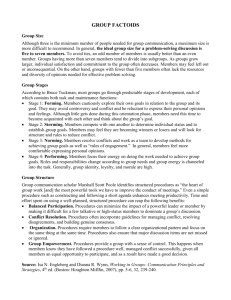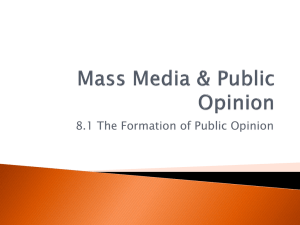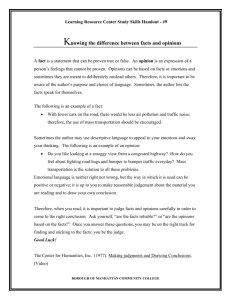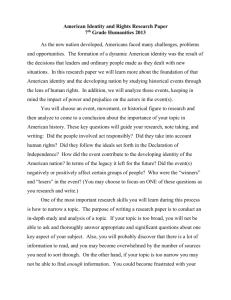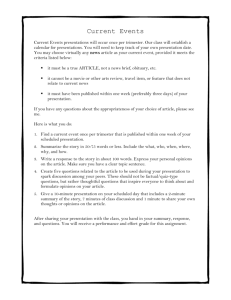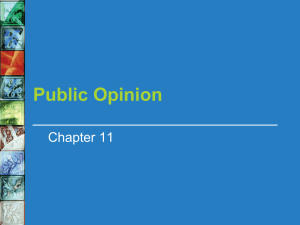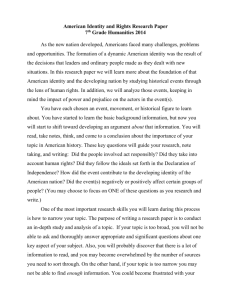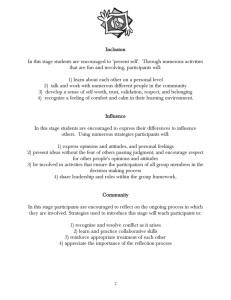Chapter 8, Test - Northwestern Schools
advertisement
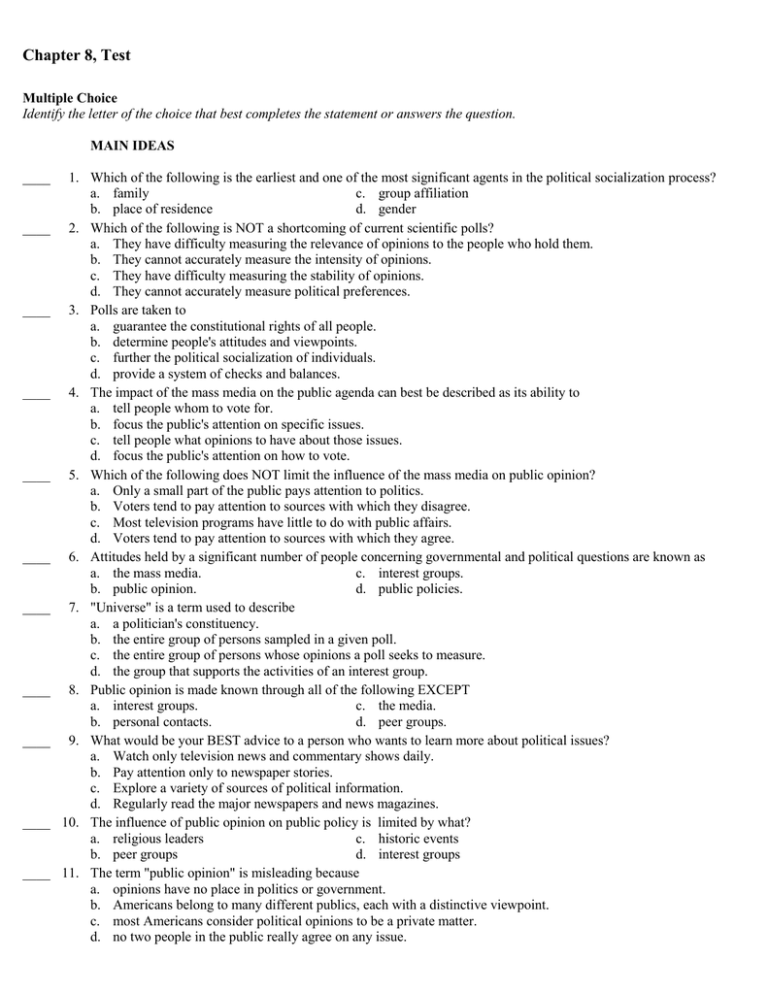
Chapter 8, Test Multiple Choice Identify the letter of the choice that best completes the statement or answers the question. MAIN IDEAS ____ ____ ____ ____ ____ ____ ____ ____ ____ ____ ____ 1. Which of the following is the earliest and one of the most significant agents in the political socialization process? a. family c. group affiliation b. place of residence d. gender 2. Which of the following is NOT a shortcoming of current scientific polls? a. They have difficulty measuring the relevance of opinions to the people who hold them. b. They cannot accurately measure the intensity of opinions. c. They have difficulty measuring the stability of opinions. d. They cannot accurately measure political preferences. 3. Polls are taken to a. guarantee the constitutional rights of all people. b. determine people's attitudes and viewpoints. c. further the political socialization of individuals. d. provide a system of checks and balances. 4. The impact of the mass media on the public agenda can best be described as its ability to a. tell people whom to vote for. b. focus the public's attention on specific issues. c. tell people what opinions to have about those issues. d. focus the public's attention on how to vote. 5. Which of the following does NOT limit the influence of the mass media on public opinion? a. Only a small part of the public pays attention to politics. b. Voters tend to pay attention to sources with which they disagree. c. Most television programs have little to do with public affairs. d. Voters tend to pay attention to sources with which they agree. 6. Attitudes held by a significant number of people concerning governmental and political questions are known as a. the mass media. c. interest groups. b. public opinion. d. public policies. 7. "Universe" is a term used to describe a. a politician's constituency. b. the entire group of persons sampled in a given poll. c. the entire group of persons whose opinions a poll seeks to measure. d. the group that supports the activities of an interest group. 8. Public opinion is made known through all of the following EXCEPT a. interest groups. c. the media. b. personal contacts. d. peer groups. 9. What would be your BEST advice to a person who wants to learn more about political issues? a. Watch only television news and commentary shows daily. b. Pay attention only to newspaper stories. c. Explore a variety of sources of political information. d. Regularly read the major newspapers and news magazines. 10. The influence of public opinion on public policy is limited by what? a. religious leaders c. historic events b. peer groups d. interest groups 11. The term "public opinion" is misleading because a. opinions have no place in politics or government. b. Americans belong to many different publics, each with a distinctive viewpoint. c. most Americans consider political opinions to be a private matter. d. no two people in the public really agree on any issue. ____ 12. All of the following are examples of the difficulties associated with measuring polls EXCEPT a. the intensity of the opinions expressed. b. the stability or changeability of an expressed opinion. c. stimulating discussion about them. d. determining the relevance of an expressed opinion. ____ 13. In the family, young children are likely to acquire a. specific viewpoints on public policy issues. b. little or no knowledge of public policy issues. c. some basic attitudes that will most likely affect their future opinions. d. attitudes that will definitely change as they begin forming their own opinions. ____ 14. The most reliable measure of public opinion is a. straw votes. c. scientific polls. b. quota samples. d. pressure groups. ____ 15. The best example of the use of random sampling to determine who will be elected as your school president would involve a. asking each student in your class whom he or she would vote for. b. asking one student in each classroom whom he or she would vote for. c. picking out a specific number of students as they leave the school, and asking whom they would vote for. d. asking every seventh student on an alphabetized list of all students whom they would vote for. ____ 16. Which form of mass media is now the principle source of political information for about 80 percent of the population of the United States? a. radio c. newspapers b. television d. magazines ____ 17. Which of the following statements does NOT describe political socialization? a. The family plays a leading role. b. Influential factors include peer groups, opinion leaders, and education. c. It ends when a person's formal education ends. d. It is the process by which a person acquires political opinions. ____ 18. Which of the following steps in scientific polling comes FIRST? a. tabulating the data c. preparing valid questions b. constructing the sample d. defining the universe ____ 19. Politicians want to have accurate information about public opinion because they can a. plan better campaigns if they know what is important to the people. b. work to discredit public opinion that differs from the views of their political party. c. evaluate whether public opinion on an issue is right or wrong. d. withdraw from a race rather than face defeat for holding an unpopular opinion. ____ 20. The free, unrestricted power of majority public opinion in American politics is limited by a. mandates. c. checks and balances. b. a straw vote. d. random samples. INTERPRETING TABLES Use the table to answer the following questions. ____ 21. Which mass media did Americans spend the most time using? a. radio c. television b. daily newspapers d. consumer magazines ____ 22. How many hours did Americans spend listening to the radio in the year 2000? a. 1571 c. 1056 b. 900 d. 154 ____ 23. How many Americans spent more time watching television than listening to the radio in 2000? a. 154 c. 515 b. 802 d. 80 ____ 24. In the year 2000, which mass media did Americans spend the least time using? a. television c. radio b. consumer online internet access d. consumer magazines ____ 25. How many hours did Americans spend reading newspapers and consumer magazines? a. 234 c. 193 b. 267 d. 154 ____ 26. Aside from television, most Americans are exposed to the use of mass media through a. radio. c. consumer magazines. b. daily newspapers. d. consumer online Internet access. Matching IDENTIFYING KEY TERMS Match each item with the correct statement below. You will not use all the terms. a. random sample b. medium c. sample d. straw vote e. quota sample f. interest group g. mass media h. sound bite ____ ____ ____ ____ ____ 27. 28. 29. 30. 31. ____ a means of communication that transmits some kind of information ____ private organization that works to affect public policy in order to benefit its members' concerns ____ portion of a population that can represent the whole population ____ a sharply focused, short report that can be aired in roughly 30 to 40 seconds ____ a poll that tries to assess opinion simply by asking the same question to a large number of people IDENTIFYING KEY TERMS Match each item with the correct statement below. You will not use all the terms. a. public opinion poll b. opinion leader c. public opinion d. quota sample e. random sample f. mandate g. mass media h. sound bite ____ ____ ____ ____ ____ 32. 33. 34. 35. 36. ____ governmental or political attitudes held by a significant number of people ____ a sample in which each member of the universe has an equal chance of being included ____ a sample constructed to represent the major characteristics of the universe ____ means of communication that reach widely dispersed audiences at the same time ____ the instructions voters give to their elected officers IDENTIFYING KEY TERMS Match each item with the correct statement below. You will not use all the terms. a. mandate b. public opinion c. public opinion poll d. quota sample e. mass media f. sample g. opinion leader h. interest group ____ ____ ____ ____ 37. 38. 39. 40. In a(n) ____, people are polled based on percentages that are set to reflect the makeup of the overall group. Because so many people were listening to the poet's political verses, he had become a(n) ____. In American politics a(n) ____ refers to the instructions or demands a constituency gives to its elected officials. The President hoped to sway ____ by asking people to reconsider the issue based on new information that had been revealed. ____ 41. The ____, including television and radio, have a huge effect on the formation of public opinion. IDENTIFYING KEY TERMS Match each item with the correct statement below. You will not use all the terms. a. public opinion poll b. public opinion c. quota sample d. peer groups e. mass media f. public agenda g. public affairs h. opinion leader ____ 42. The senator decided to check the results of a(n) ____ to obtain a sound indicator of how her constituency felt about the issue. ____ 43. ____ are made up of the people with whom one regularly associates, including friends, classmates, neighbors, and co-workers. ____ 44. Public opinion includes only those views that relate to ____. ____ 45. The societal problems that political leaders and citizens agree need government attention is known as the ____. ____ 46. A ____ is a person who has more than the average influence on public opinion. Essay CRITICAL THINKING 47. Expressing Problems Clearly What makes public opinion so difficult to ascertain? 48. Identifying Central Issues How can an opinion held by the public NOT be a public opinion? 49. Distinguishing Fact from Opinion The text states that election results are seldom an accurate measure of public opinion. Explain why you agree or disagree with this statement. 50. Making Comparisons Compare the kinds of preparations that would go into a candidate's television appearance versus those that might go into his or her radio broadcast. 51. Identifying Alternatives Suppose you want to take a scientific poll about people's opinions on a new boating law for Lake Blue. Who should make up your universe—all people in the United States, only townspeople, only boat owners, only people who live on the lake, anyone who uses Lake Blue, or some other group? Support your decision. 52. Determining Relevance Does the fact that the President gets a daily report of information from top news sources suggest undue influence of the media on government? Explain. ESSAY 47.Public opinion is hard to determine because there are so many topics and issues on which people can hold opinions and so many different groups and categories to which each person can belong. People can change their opinions suddenly. People sometimes even hold contradictory opinions without realizing it. 48.The definition of the term public opinion requires that the opinion be related to political or governmental attitudes, not to attitudes about other aspects of life. Many people can believe that cats are the best pets, but since the belief does not affect public policy, it cannot be called a public opinion. 49.Answers will vary. Because so many factors influence voting, it is impossible to know for sure. Many issues other than public opinion affect whom a voter will vote for in an election. Party identification and personal preference may draw a vote that is not based on issues. 50.For a television appearance, the emphasis would probably be on preparing a short, focused story or message; making sure the candidate appeared neat, trustworthy, organized, kind, intelligent, and literate; and practicing in front of a camera. For a radio broadcast, a longer message might be prepared. The person's appearance would be of little consequence, and the person might have to practice speaking in order to make his or her voice sound strong, clear, and intelligent. 51.The best universe would be all people who use the lake. This would include people living on the lake and people who come to the lake for recreational boating and other facilities. These are the people who would be most affected by the change. Moreover, the results would include responses from people who do and do not own boats, so the results would not be biased by boat ownership. 52.The President's reading of these reports should have no more effect on his or her policies and decisions than the voters' exposure to mass media information has on voter opinions. The President must not be swayed by the media. The number of different sources helps prevent one source from having an overly strong influence. The system of government puts checks and balances on the powers of the President.

